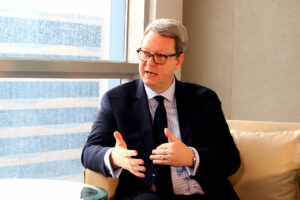How SMIC balances risk preparedness with community gains
SM Investments Corp. (SMIC) is working to enhance the conglomerate’s preparedness for future risks while driving long-term benefits for communities and the environment, according to Timothy Daniels, SMIC consultant for investor relations and sustainability. The conglomerate is dedicating 10% of its annual capital expenditure (capex) budget, primarily through SM Prime Holdings, Inc., to incorporating disaster-resilient […]

SM Investments Corp. (SMIC) is working to enhance the conglomerate’s preparedness for future risks while driving long-term benefits for communities and the environment, according to Timothy Daniels, SMIC consultant for investor relations and sustainability.
The conglomerate is dedicating 10% of its annual capital expenditure (capex) budget, primarily through SM Prime Holdings, Inc., to incorporating disaster-resilient features across its businesses, Mr. Daniels told Editor-in-Chief Cathy Rose A. Garcia during an episode of BusinessWorld One-on-One online interview series themed “The Reinvention of Business.”
“Sustainability is also thinking about the long-term risks, which a business should be thinking about. You have to pull back for a second and not get hung up on the frameworks,” he added.
For 2024, SMIC has allocated up to P115 billion in capex to support its expansion plans.
“We do look very long term, and we think we have a tremendous amount to contribute in the areas where we are experts. I think how we want to do it is to create win-win situations for everybody,” Mr. Daniels said.
He noted that the SM group’s companies each have their own sustainability initiatives.
“Every part of the group has sustainability things… Whether it’s looking at how to design energy-efficient buildings, how to prepare for disaster resilience or climate change, those are very property specific initiatives in SM Prime,” he said.
“In our retailing arm, it’s very customer-facing initiatives. We introduce more green habits and more green products into the country. In our banks, it’s how we create financial inclusion, and funding green and blue projects and renewable energy,” he added.
Mr. Daniels said incorporating sustainability features will pay off in the long term.
“When we look at the environment, it’s extra cost to design and build buildings that are energy efficient and disaster resilient. But we get it back by being more efficient operators,” he said.
“In the long term, we get it back by being prepared for when the worst things could happen. There isn’t a trade-off from our point of view between being responsible and being a successful business. Being a successful business means you think responsibly,” he added.
He said companies can benefit both shareholders and communities without losing profitability.
“A successful long-term company thinks about its stakeholders. It’s just a wise business decision to look after the people who make you successful. It’s a very practical thing that corporates should do to protect their own assets. If you do it right, you can also look after tenants, the communities around us, and we can try to make sure that everybody is gaining from how we think about dealing with climate change,” Mr. Daniels said.
“One of the things you have to realize is it’s not a trade-off between doing good business and doing sustainable business. It’s actually the same thing. As a group overall, we have a very big role to play in creating modern development, in creating employment, in creating economic growth. That benefits so many people,” he added. — Revin Mikhael Ochave












